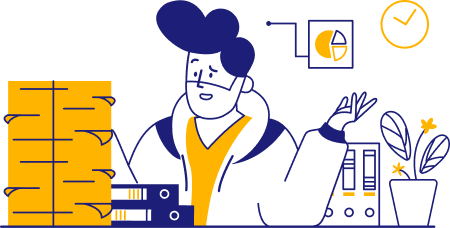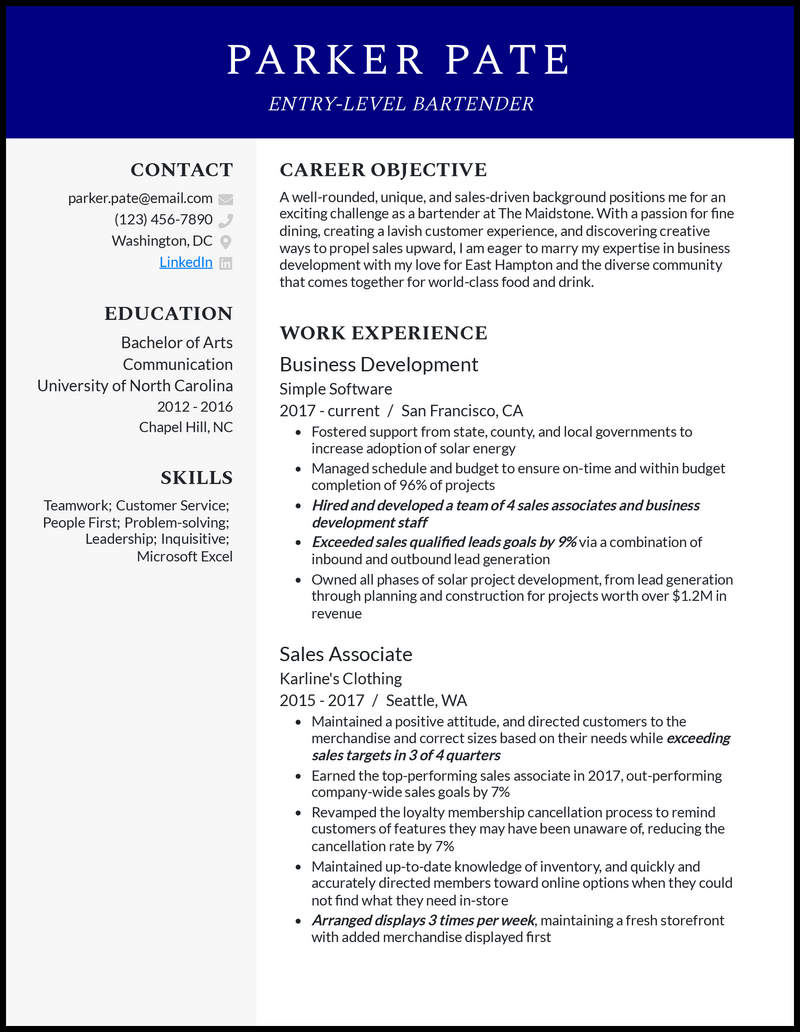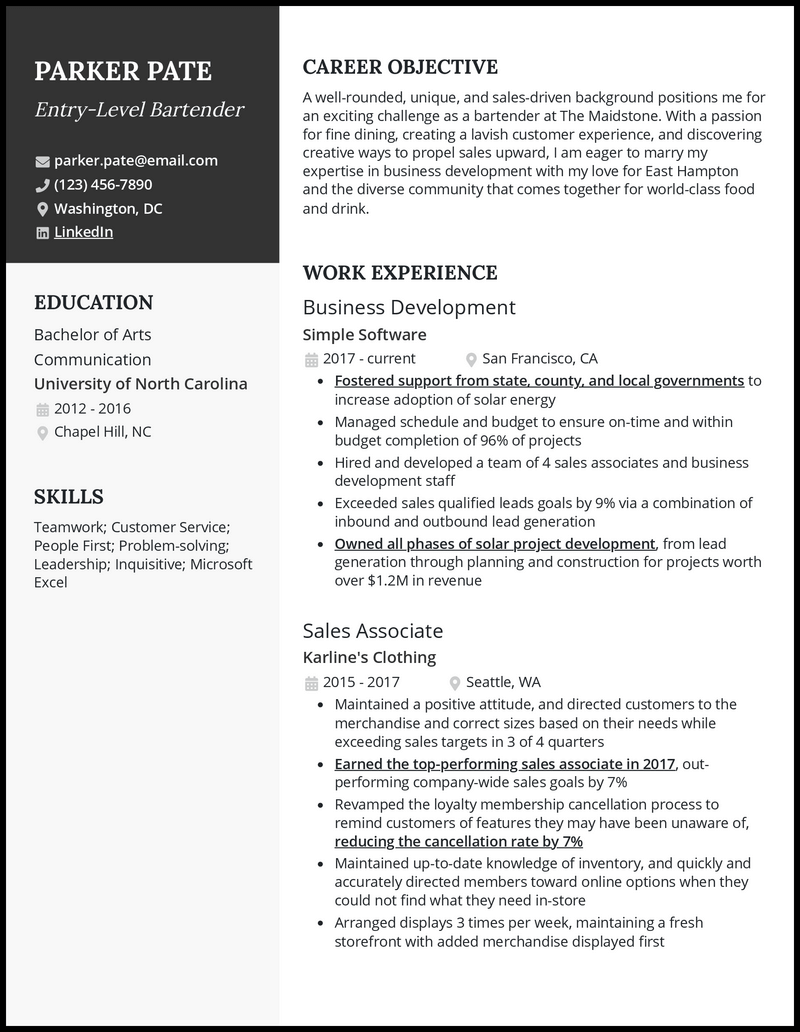“Where do I want to go next?” mused Parker as he looked at his entry-level bartender resume, which, so far, only contained his personal information and job title. He enjoyed his current work environment, but he could feel the growing itch to do something new.
After a quick Google search on what current resumes should look like, he found our library of resume templates and realized: Maybe the opportunity for that job change was more attainable than he’d expected. His past experience in retail and business wasn’t super relevant—but after learning about career objectives, translatable skills, and cover letter writing, Parker was ready.
Luckily, Parker found an entry-level role that fit him perfectly, and he quickly settled into his new role. Whether you have translatable work experience or find yourself starting from ground zero, you can find similar success by following our guidance like Parker!
Why this resume works
- Tying yourself in knots when applying for that entry-level bartender job? It’s a common scene. But here’s some good news—keeping the overplayed buzzwords out of your entry-level bartender resume (even in the career objective) might just be the ticket to getting that callback.
- Why’s that? Thousands of candidates have trotted terms like seasonal professional, innovative, go-getter, and results-driven, out time and again that they’ve lost their zing. They only hurt your authenticity, as if you’re trying to puff up your credentials. So, drop those cliches and stay genuine—after all, this is a junior role.
Related resume examples
What Matters Most: Your Skills & Experience Sections

As an entry-level bartender, your skill set is super important! Your skills list will let recruiters know that you have all the necessary tools at hand, ready to apply towards excellent bartending regardless of your past experience level.
Make sure all your skills apply directly to your job role, and do away with anything too generic. For example, don’t say “communication” when you really mean “hosting” or “customer greeting.”
Specify whether you use any programs to get your job done, too—and be as technical as you can about how you present your interpersonal skills within the bartending context. Hone each list item down into what you use your social and trade-focused abilities for.
9 most popular entry-level bartender skills
- Customer Service
- Problem-solving
- Mixology
- Food Service
- Cash Register
- Leadership
- Google Docs
- MS Excel
- Hosting/Greeting
Sample entry-level bartender work experience bullet points
Your experience section is there to show how you’ve used your abilities to make a positive impact in the working world! If you’re seeking an entry-level bartending job, your past experience might not be directly related to your current goals.
Luckily, you can still spin past experience from other jobs to your advantage: There are bound to be areas that overlap, such as that time you earned an excellent customer feedback rating. Hand-pick whichever aspects of your previous achievements are most relevant.
And always provide metrics for how your achievements left an impact! Recruiters love to see quantifiable data since it gives them an idea of your positive influence in the workplace and what you could offer as a bartender.
Here are some nice samples:
- Revamped the loyalty membership cancellation process to remind customers of features they may have been unaware of, reducing the cancellation rate by 7%
- Maintained a positive attitude while giving purchase advice to customers based on their individual preferences, earning a customer feedback rating of 4.8/5 stars
- Exceeded sales qualified leads goals by 12% via both inbound and outbound lead generation and retention
- Managed schedule and budget to ensure on-time and affordable completion of 96% of projects
Top 5 Tips for Your Entry-Level Bartender Resume
- Don’t overthink your examples
- It’s easy to get stuck in the weeds once you dive into your experience section’s bullet points, but try to keep things simple. Just share what you did to improve customer satisfaction, why, and how—and then provide quantifiable results that tie in with bartending.
- Use the “why” to your benefit
- Context is crucial: If your previous work experience is tricky to link with your current bartending job goals, you might wind up with a lot of similar metrics or examples. Add some interest back into the mix with little background details (like party themes) that paint a more vivid picture of your accomplishments!
- Keep your template sleek
- Streamlined is the way to go for your resume layout! Avoid the temptation to add any fluff, and pick a template that puts your best work in the spotlight while allowing your other sections room to breathe. Don’t cram your best customer satisfaction and drink mixing achievements where they’ll go unnoticed.
- Make readability number one
- Since recruiters have such little time to allocate to each resume during their initial pass (just a few seconds on average), prioritize readability. That means keeping color to a minimum, maintaining high contrast, and using extremely clear, plain fonts. Think of it like preventing drink flavors from clashing!
- State your objective
- If you’re entering a field or changing careers, then a resume objective might just be the finishing touch you need! Make sure you use the page space to share new, unique qualifications that are informative and reinforce your preparedness for an entry-level bardtending role.
Honestly, one of the best things you can do to stand out to recruiters is to show alignment with the job description. Revisit the job ad for each application and look for key customer service or bartending abilities to reflect (like a positive attitude and fast-paced time management).
We’d recommend an objective over a summary for your resume if you’re applying for an entry-level job. The resume objective gives you a place to describe your bartending career goals and how you’re qualified for the role, instead of summing up your past experience.
There’s no need to cram the page, especially if you have to pull in weaker examples to do it. Your resume must be under one page, but keep all your bartending-related experiences and examples of quick customer response times top quality and don’t be afraid to leave a bit of white space on the page.




![3 Entry-Level Bartender Resume Examples [& Templates]](https://beamjobs.wpenginepowered.com/wp-content/uploads/2023/03/entry-level-bartender-standout-resume-example.png)



